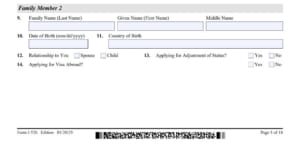If you are a Lawful Permanent Resident (“LPR”) and need to travel outside the U.S for a temporary trip abroad, you generally do not need to apply for any special document to return to the United States. Your valid Form I-551, more commonly known as a “Green Card”, is usually the only document you need to return following a brief trip abroad. However, if you intend or believe that you will be outside the U.S. for an extended period of time, you can consider applying for a reentry permit.
The reentry permit tells the U.S. government that you are going abroad for an extended period of time but still intend to maintain your permanent residence. The use of a re-entry permit does not 100% guarantee readmission to the U.S., but it is strong prima facie evidence of the holder’s intent to remain a permanent resident of the United States. With a valid re-entry permit, an LPR should be able to remain outside the U.S. for up to 2 years and return as long the re-entry permit has not expired.
Of course, upon reentry, the LPR should also be able to demonstrate that he or she has maintained other ties to the U.S. that show permanent resident intent. These can include, but are not limited to, maintaining a residence such as a home or apartment, filing U.S. tax returns, maintaining insurance, maintaining a driver’s license in the state of residence, immediate family members staying in the U.S., bank accounts, etc.
Some circumstances for which you might consider applying for a re-entry permit are for taking care of business or family matters which may take a long time to complete, temporary posting of a job assignment overseas for a U.S. company or government agency or other U.S. employer, medical treatment for you or a family member, an extended study program, etc. It is important to note that a reentry permit is not a permanent pass to live outside the U.S. if you are a lawful permanent resident.
While it may not be practical to apply for a re-entry permit if your trip abroad will be for less than six months, a you should consider applying in consideration of travel restrictions imposed by the COVID 19 pandemic and the uncertainty of free and unrestricted travel.
To apply for a re-entry permit, you should file a Form I-131 Application for Travel Document. You must be in the U.S. when you file the application form. You will receive a biometrics appointment notice in about 1 month. You do not need to wait in the U.S. for the appointment notice. If you left the U.S., you can return for the appointment. You also do not need to wait for the reentry permit to be issued. For example, you can leave the U.S. and have someone mail you the reentry permit after it arrives at the U.S. address you provide in your application.
If you need to travel for an extended period and want to consider applying for a reentry permit, contact us at info@enterlinepartners.com and speak with a U.S. immigration attorney in Ho Chi Minh City, Manila and Taipei.
ENTERLINE & PARTNERS CONSULTING
Ho Chi Minh City, Vietnam Office
Suite 601, 6th Floor, Saigon Tower
29 Le Duan Street
Ben Nghe Ward, District 1
Ho Chi Minh City, Vietnam
Tel: +84 933 301 488
Email: info@enterlinepartners.com
Facebook: Enterline & Partners – Dịch vụ Thị thực và Định cư Hoa Kỳ
Website: http://enterlinepartners.com
Manila, Philippines Office
Tel: +632 5310 1491
Email: info@enterlinepartners.com
Facebook: Enterline and Partners Philippines
Website: https://enterlinepartners.com/language/en/welcome/
Copyright 2021. This article is for information purposes only and does not constitute legal advice. This article may be changed with or without notice. The opinions expressed in this article are those of Enterline and Partners only.




